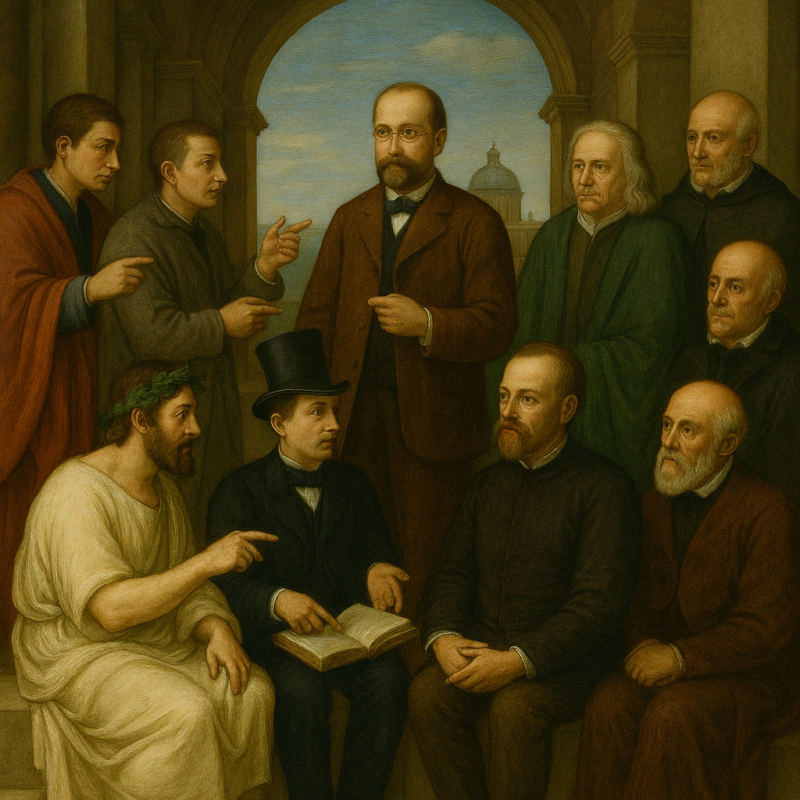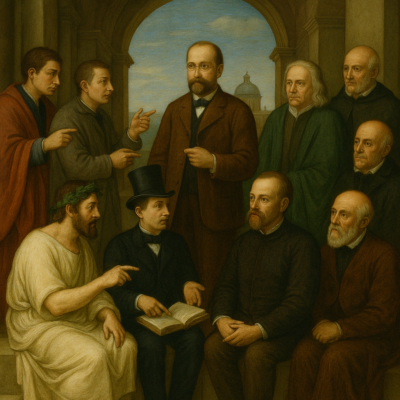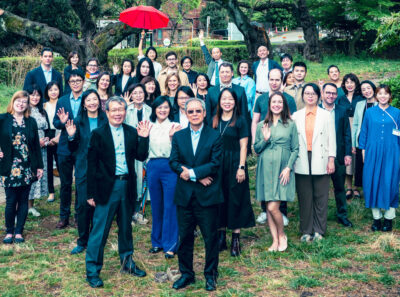Deep Interdisciplinarity: Reading Michel Serres

Author: Cintia Kozonoi Vezzani
It’s my pleasure to introduce a new blog series linked to the Deep Interdisciplinarity reading group at Tokyo College. For the last year, we have been meeting every month to discuss foundational questions about research methods and the future of academic scholarship. In this series, we will share insights gained from these discussions, from our readings, and from our own scholarly practice. It will also be a place where colleagues from across Tokyo College and beyond can also communicate their thoughts on the same themes.
When I heard about a new group being formed at Tokyo College around the topic of “Deep Interdisciplinarity,” I decided that I had to be a part of it. The name of the group immediately caught my attention. As someone who has often struggled against disciplinary boundaries, I appreciated the idea of “deep” interdisciplinarity as a rebuttal to the potential charge of “dilettantism” that is occasionally leveled at interdisciplinary research. It had not escaped my notice that while most scholars feel compelled to split their subjects up into smaller and smaller subtopics (for example, I often describe myself as a specialist of 19th-century Brazilian literature), many of the most lively parts of the academy are those areas where disciplines are allowed to overlap. We can see this in the novel portmanteaus that increasingly grace university course catalogs: biorobotics, neuroaesthetics, paleovirology, phytosemiotics, geophilosophy, etc.
However, despite this profusion of new lines of research, there remains a certain latent skepticism about those who practice them. There is a mental image of someone skimming over the disciplines, haphazardly taking up theories and concepts without understanding the frameworks that gave rise to them. But the idea of deep interdisciplinarity summoned an entirely different image. I imagined a scholar burrowing down into their discipline until getting so lost in pursuit of a question that they find themselves tunneling through a strange new set of texts and practices.
Here was not only a refreshing way to think about scholarship, I thought, but also the outlines of a radical new method.
It was in this spirit that our monthly meetings began. Led by Professor Naoko SHIMAZU and affiliated faculty member Professor Jean Louis VIOVY, our group includes Associate Professor Trent BROWN, Associate Professor Michael FACIUS, Postdoctoral Fellow Alarith UHDE and myself, Postdoctoral Fellow Cintia Kozonoi VEZZANI.
For this first blog post in the series, I would like to highlight a text that has inspired my own interdisciplinary forays: Conversations on Science, Culture, and Time: Michel Serres with Bruno Latour.
The book consists of transcripts of conversations between the French philosophers Michel Serres and Bruno Latour. Recorded in the 1990s, these conversations are all the more meaningful now that both of these intellectual giants have recently passed away. The book is an excellent introduction to the ideas of Michel Serres, especially, who spends much of the time explaining his methods to the sympathetic Latour.
Whenever I read Michel Serres, I am reminded of my own child playing in a garden. She does not know how to keep to the hardscape path, and always insists on walking through the flower beds. Even in his declining years, Michel Serres remained a child in the garden of knowledge. Each of his books is a document of an errant journey through the history of ideas, and even the most familiar names are suddenly seen from startling new angles.
While there is something childlike about Serres, there is also something vaguely criminal. He is guilty of a host of epistemic offenses, most of them involving the improper distribution of adjectives. For example, he insists on referring to the writings of the ancient Roman poet Lucretius as scientific. He casually refers to the work of the physicist Sadi Carnot as poetic. And when Latour confronts him about these crimes against epistemology, Serres does not even apologize! No, he doubles down:
“I maintain that there is as much reason in the works of Montaigne or Verlaine as there is in physics or biochemistry and, reciprocally, that often there is as much unreason scattered through the sciences as there is in certain dreams. Reason is statistically distributed everywhere; no one can claim exclusive rights to it.”
Serres has little time for the strictures of the university, whose primary function he sees as “the reproduction of obedient young people.” His own biography shows the potential of a different approach to education, one that shows little respect for our tendency of splitting space-time into discrete subject areas.
“I earned a degree in classical studies, in Greek and Latin,” he tells Latour, “and I was also trained in science, earning two degrees in mathematics.” These were the hybrid seeds from which his mutant philosophy sprouted. But perhaps the most consequential effect of his reading “Plutarch and the great physicists… at the same time,” is the bizarre concept of time that these readings helped to foster.
For Serres is adamantly unwilling to accept any notion of progress. Yet he is not a conservative lamenting cultural decline. Rather, he is convinced that each given moment in time is a compressed palimpsest of pasts and futures. De rerum natura by Lucretius is a twenty-first-century physics textbook masquerading as an ancient book of poetry. Réflexions sur la puissance motrice du feu et sur les machines propres à développer cette puissance by Carnot is an ancient cosmological epic masquerading as a nineteenth-century physics textbook.
Serres himself often seems less like a scholar than a manifestation of the trickster god Hermes, whose symbolism he often drew on. It is worth noting once more that this book, which contains the clearest articulation of Serres’s thought, takes the form of a series of dialogues. Despite the fact that the Socratic dialogues are still regarded as philosophy’s crowning achievements, few contemporary philosophers deign to publish their ideas in this ancient form. Happily, Serres is not like other philosophers. And in this book, he and Latour assume the roles of Socrates and Theaetetus, using each other’s wits as tools to uncover the foundations of knowledge.

School of Athens featuring the philosophical influences of Michel Serres, produced by GPT-4o
In a way, the Deep Interdisciplinarity group is also a gesture toward this defunct approach to thinking. By getting together to discuss texts like this one, we hope to find common ground underneath the institutional barriers that tend to keep certain thoughts apart.
At one point, Serres asks Latour: “What good is philosophy if it doesn't give birth to the world of the future?” What he says of philosophy could also be asked of scholarship more broadly. And it is my hope that deep interdisciplinarity—and our little group—may help bring about a vastly more interesting and thought-provoking world.








